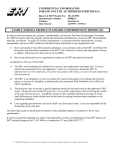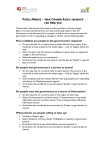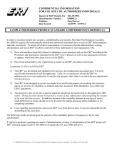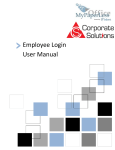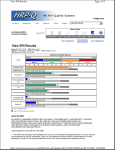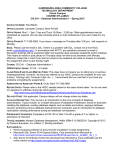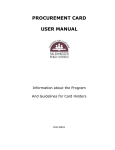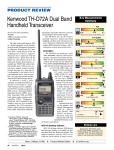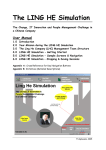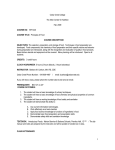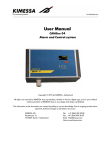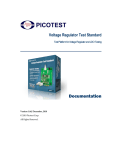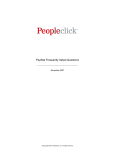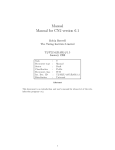Download HERE
Transcript
CONFIDENTIAL INFORMATION FOR USE ONLY BY AUTHORIZED INDIVIDUALS ` Report of ERI® Results For Questionnaire Number : Position: Date Scored: 101-45-9552 05000121 Food Server 12/29/99 15:59:14 SAMPLE PREFERRED PROFILE EXTENDED COMPREHENSIVE REPORT (E) In order to maximize proper use, accuracy, confidentiality, and security, Bay State Psychological Associates, Inc. (BSPA) requires that only properly trained and authorized individuals have access to ERI® documentation, materials, and results. To ensure all of these requirements, it is necessary that the administration, scoring, interpretation, and use of ERI® results be restricted to those individuals in your organization who: 1) Have read and have been fully trained to administer, score, interpret, and use the ERI® according to the Procedures and Instructions contained in the ERI® User's Manual, as well as any subsequent revisions or updates, which may have been sent to you by BSPA. 2) Have been authorized by your organization to make use of ERI® procedures and results. Limitations To The Use Of The ERI® 1) The ERI® was developed and validated to be used as a pre-employment assessment tool. It is to be used for the assessment of new job applicants. Under no circumstances should the ERI® be administered to current employees, or used for any purpose other than as an aid in the pre-employment selection process. 2) The ERI® is not designed to reveal, nor should it be used for the purpose of revealing, the existence, nature, or severity of a disability, as defined under the Americans With Disabilities Act (ADA) and EEOC regulations. 3) The decision to hire or not hire a specific applicant should not be based solely on the applicant’s ERI® scores. Hiring decisions should be based on a review of ALL information collected during the conduct of the total selection process. In addition, because of the variability inherent in any type of scores, small differences in results should never be the basis for making decisions about candidates or for comparing candidates. 4) Laws regarding questionnaires such as the ERI® vary from state to state. Users are responsible for the monitoring of any such laws. The following results are based upon the analysis of the candidate's pattern of responses to the 81-item questionnaire. If you have questions regarding any aspect of administration, scoring, or interpretation of the ERI® please call ERI® technical support at (617) 367-8400 or if outside the 617 area, (800) 438-2772. F:\WORD\ERI\Admin and Scoring Methods\Fax\Sample Reports\Sample Fax Report E2.doc/pdf CONFIDENTIAL INFORMATION FOR USE ONLY BY AUTHORIZED INDIVIDUALS Report of ERI® Results For Questionnaire Number : Position: Date Scored: ` 101-45-9552 05000121 Food Server 12/29/99 15:59:14 The following results are based upon the analysis of the candidate’s pattern of responses to the 81-item questionnaire Likelihood of Unreliable Behavior Lowest ZONE 1 ZONE 2 Highest ZONE 3 ZONE 4 SCALE A B A B A Freedom From Disruptive Alcohol Or Illegal Drug Use Courtesy Emotional Maturity Conscientiousness Trustworthiness Job Commitment Safe Job Performance Company's Preferred Profile Applicant's Profile C:\WORD\ERI\ADMIN AND SCORING METHODS\FAX\FAX OUTPUT FORMAT1B.DOC F:\WORD\ERI\Admin and Scoring Methods\Fax\Sample Reports\Sample Fax Report E2.doc/pdf B A B CONFIDENTIAL INFORMATION FOR USE ONLY BY AUTHORIZED INDIVIDUALS ` Report of ERI® Results For Questionnaire Number : Position: Date Scored: 101-45-9552 05000121 Food Server 12/29/99 15:59:14 EXTENDED INTERPRETIVE REPORT Freedom From Disruptive Alcohol and Illegal Drug Use - A This scale assesses the likelihood that a candidate’s work performance will be reliable, in that if the person uses alcohol or illegal drugs, his/her performance will not be disrupted by behaviors such as inattentiveness, unauthorized absence/lateness, failing to follow through on assignments, or other inappropriate work behaviors. It is important to emphasize that this scale does not assess the extent of prior or current alcohol or illegal drug use. Similarly, it is not designed to reveal, nor should it be used for the purpose of revealing, the existence, nature, or severity of a disability. 2-B This is a good score. The candidate answered the questionnaire statements similarly to individuals whose work performance has not been disrupted by behaviors such as inattentiveness, unauthorized absence/lateness, failing to follow through on assignments, or other inappropriate work behaviors.. The candidate’s score on this scale is poorer than 37% of job candidates. . This suggests that if the candidate uses alcohol or illegal drugs, there is a reasonably good likelihood that job performance will not be disrupted by such use. Courtesy - C This scale assesses the likelihood that a candidate’s work performance will be reliable in that it will be characterized by a high level of courtesy and commitment to service. 3-B The candidate’s score on this scale is poorer than 80% of job candidates. This suggests that if the candidate will be interacting with customers/guests, these interactions may not be characterized by a high level of courtesy and customer service. For this reason, you should use the structured follow-up questions for the C scale during interviews and reference checks to further clarify/confirm this possibility. In general, candidates who get poorer scores on this scale tend to have the following personality characteristics: (1) Being cynical, outspoken, and liking to avoid pressure or hard work; (2) Feeling discontented, dull, and having difficulties relating to strangers; and (3) Avoidance of interacting with or being involved with other people; (4) Rigid inflexibility. During interviews and reference checks you should ask additional questions which can help you determine whether or not these particular personality characteristics are present in this candidate. This represents an additional technique for clarifying/confirming the accuracy of the candidate’s score on this scale. F:\WORD\ERI\Admin and Scoring Methods\Fax\Sample Reports\Sample Fax Report E2.doc/pdf CONFIDENTIAL INFORMATION FOR USE ONLY BY AUTHORIZED INDIVIDUALS ` Report of ERI® Results For Questionnaire Number : Position: Date Scored: 101-45-9552 05000121 Food Server 12/29/99 15:59:14 Emotional Maturity - E This scale assesses the likelihood that a candidate’s work performance will be reliable, in that it will be characterized by mature behavior, and that it will not be disrupted due to the presence of maladaptive personality traits such as irresponsibility, poor judgment, difficulty in working cooperatively with others, poor frustration tolerance, or poor impulse control. It is important to emphasize that this scale does not assess, nor should it be used to assess, for the presence of a mental or psychological impairment or disorder, or an applicant's general physical or psychological health. 3-A The candidate's score on this scale is poorer than 78% of job candidates. This suggests there is an above average likelihood that job performance may be disrupted by maladaptive personality traits such as irresponsibility, poor judgment, difficulty in working cooperatively with others, poor frustration tolerance, or poor impulse control. . For this reason, you should use the structured follow-up questions for the E scale during interviews and reference checks to further clarify this possibility. In general, candidates who get poorer scores on this scale tend to have the following personality characteristics: (1) The presence of maladaptive personality traits; (2) Frequently fluctuating self esteem; and (3) Pervasive denial of any form of frustration or inner conflict. During interviews and reference checks you should ask additional questions which can help you determine whether or not these particular personality characteristics are present in this candidate. This represents an additional technique for clarifying/confirming the accuracy of the candidate’s score on this scale. Conscientiousness - F This scale assesses the likelihood that a candidate will perform on the job in a conscientious manner, will follow rules and procedures, and will not be fired work performance will be reliable, in that it will be characterized by mature behavior, and will not be fired. 2-B The candidate's score on this scale is poorer than 69% of job candidates. This suggests there is a moderate likelihood that job performance will be characterized by an acceptable level of conscientiousness and compliance with rules and procedures. F:\WORD\ERI\Admin and Scoring Methods\Fax\Sample Reports\Sample Fax Report E2.doc/pdf CONFIDENTIAL INFORMATION FOR USE ONLY BY AUTHORIZED INDIVIDUALS ` Report of ERI® Results For Questionnaire Number : Position: Date Scored: 101-45-9552 05000121 Food Server 12/29/99 15:59:14 Trustworthiness - H This scale assesses the likelihood that a candidate will perform on the job in a trustworthy manner. 2-B The candidate's score on this scale is poorer than 67% of job candidates. This suggests there is a moderate likelihood that job performance will be characterized by an acceptable level of trustworthiness. Long Term Job Commitment - Q This scale assesses the likelihood that a candidate will make a long term commitment to the job and will not quit shortly after being hired. 3-A The candidate's score on this scale is poorer than 82% of job candidates. This suggests there is a below average likelihood that job performance will be characterized by an acceptable level of long-term job commitment. For this reason, you should use the structured follow-up questions for the Q scale during interviews and reference checks to further clarify this possibility. In general, candidates who get poorer scores on this scale tend to have the following personality characteristics: (1) Experiencing personal feelings of dullness and a lack of involvement in one's life and society; (2) Having a hedonistic outlook (living for the pleasure of the moment); and (3) Avoidance of personal involvement, challenge, or complexity. During interviews and reference checks you should ask additional questions which can help you determine whether or not these particular personality characteristics are present in this candidate. This represents an additional technique for clarifying/confirming the accuracy of the candidate’s score on this scale. Safe Job Performance - S This scale assesses the likelihood that a candidate will perform on the job in a safe manner and will not have a significant on-the-job accident. 2-B This is a good score. The candidate's score on this scale is poorer than 46% of job candidates. This suggests there is a reasonably good likelihood that the candidate will perform on the job in a safe manner. F:\WORD\ERI\Admin and Scoring Methods\Fax\Sample Reports\Sample Fax Report E2.doc/pdf CONFIDENTIAL INFORMATION FOR USE ONLY BY AUTHORIZED INDIVIDUALS ` Report of ERI® Results For Questionnaire Number : Position: Date Scored: 101-45-9552 05000121 Food Server 12/29/99 15:59:14 SUGGESTED FOLLOW-UP INTERVIEW QUESTIONS Asking the following questions, during your next interview with the candidate, will help you to gain a more complete understanding of the applicant, BEFORE you make a hiring decision. Be sure to write down the candidate’s answers to each of the questions. Courtesy 1) Just about everyone has times when customers/guests get to them. What kind of situations can cause you to feel this way? 1a) How do you (how would you) usually respond when this happens? 2) Eventually everyone runs into a customer/guest who keeps on complaining no matter what you do to help them. How do you (how would you) deal with situations like this when they occur? 3) The position you are applying for requires that you always be friendly and courteous to customers/guests. On the other hand, everybody has days when they are in a bad mood themselves. When you have a "bad" day how do you (how would you) try to keep it from affecting your contacts with customers/guests? 4) How do you (how would you) deal with situations where a customer/guest is rude to you? 5) When there are lots of customers/guests all asking for help at the same time, how do you (how would you) deal with the situation? Emotional Maturity A Note Regarding Questions Which Might Be Asked When a Candidate’s Score On This Scale Is Outside The Preferred Profile In determining whether to ask applicants or past employers follow-up questions regarding the presence of maladaptive personality traits, it is important that you be mindful of the provisions of the Americans With Disabilities Act (ADA), as well as any other applicable statutory or regulatory restrictions which may exist regarding the issue of disability/handicap due to mental or psychological impairment or disorder. Specifically, questions should be appropriately phrased so as to not evoke responses indicative of mental or psychological impairment or disorder. It should be emphasized that the need for limiting questions to those regarding maladaptive personality traits, of the type described above, is particularly important where the interviewer unintentionally learns that an individual may have successfully undergone treatment for a psychological impairment or disorder. It is important to emphasize that this scale does not assess, nor is it intended to assess, for the presence of a mental or psychological impairment, or disorder, or an applicant’s general physical or psychological health. Rather, it assesses whether an individual’s job performance is likely to be disrupted due to the presence of maladaptive personality traits such as irresponsibility, poor judgment, difficulty in working cooperatively with others, poor frustration tolerance, or poor impulse control. F:\WORD\ERI\Admin and Scoring Methods\Fax\Sample Reports\Sample Fax Report E2.doc/pdf CONFIDENTIAL INFORMATION FOR USE ONLY BY AUTHORIZED INDIVIDUALS ` Report of ERI® Results For Questionnaire Number : Position: Date Scored: 101-45-9552 05000121 Food Server 12/29/99 15:59:14 1) Just about everyone has times when the pressure gets to them and they find it difficult to relax. What kind of situations can cause you to feel this way? 1a) What do you usually do when you feel this way? 2) Just about everyone has times when they feel unappreciated at work, and feel that others are treated better than they are. When this happens to you, how do you deal with it? 3) What kinds of things at work get you the most frustrated? 3a) When this happens, how do you deal with the situation? Please give me an example. 4) When things don’t go your way, how do you deal with the situation? 4a) Please give me an example that typifies how you deal with this kind of situation. Job Commitment Begin the questions with a statement something like the following: “It is quite common for people to leave one job and move on to a new one. The reasons for this differ from person to person.” 1) Could you please tell me why you are interested in changing jobs at this time? (Details) 2) I notice on your application that your previous job was with (Name of Company). What were your reasons for leaving that position? (Inquire as to the reasons for leaving each previous employer listed in the application, getting specific details.) 3) What is the most interesting/exciting job you have ever had? (Ask for details regarding who, where, when, and what made it so interesting) 4) What kind of personal challenges do you look for in a job? At the end of your interview with the applicant, be sure to ask the following: I would like to speak with the person who was your supervisor at one or two of your previous jobs. Is that okay with you? (If not, ask for the reasons). Be sure to get the name of each person, company name, and phone number. SUGGESTED FOLLOW-UP REFERENCE CHECK QUESTIONS Asking the following questions during your reference checks with the candidate’s past supervisors, will also help you to gain a more complete understanding of the person, BEFORE you make a hiring decision. Be sure to write down the candidate’s answers to each of the questions. • Begin by telling the reference the type of position for which the applicant is being considered. Then tell the reference: F:\WORD\ERI\Admin and Scoring Methods\Fax\Sample Reports\Sample Fax Report E2.doc/pdf CONFIDENTIAL INFORMATION FOR USE ONLY BY AUTHORIZED INDIVIDUALS ` Report of ERI® Results For Questionnaire Number : Position: Date Scored: 101-45-9552 05000121 Food Server 12/29/99 15:59:14 “These are some of the characteristics which are important for the job for which Mr. / Ms. “X” is applying. Do you know of any cause for concern with respect to each of the following characteristics?” Ability to consistently exercise sound judgment Ability to work under pressure Ability to follow through with job assignments on time Compliance with company policies and procedures Productive and conscientious job performance Could you please give me an example of his/her work performance that demonstrates any of these qualities? • If Mr. / Ms. “X” did not have problems with following through on job assignments and/or exercising sound judgement on the job, I would appreciate you telling me. • If Mr. / Ms. “X” did not have problems with working under pressure and/taking personal initiative and responsibility for doing a good job, I would appreciate you telling me. • If poor job performance and poor productivity were not a problem with Mr. / Ms. “X”, I would appreciate your telling me. (Ask for Details) If customer service is also a part of the position for which the applicant is applying ask the following question. If customer service is not an important part of the position, skip to the next question. • “These are some of the other characteristics which are important for the job for which Mr. / Ms. “X” is applying. Do you know of any cause for concern with respect to each of the following characteristics?” Demonstrating courtesy, constant politeness, and a positive attitude toward customers Presenting a genuine friendly and outgoing manner Remaining courteous even during difficult confrontations with customers • Do you know of any situation that would be a cause for concern with Mr. / Ms. “X”, regarding trustworthiness on the job? (Ask for Details) • If trustworthiness was not a problem with Mr. / Ms. “X”, I would appreciate your telling me. • Did Mr. / Ms. “X” ever receive a warning or reprimand while employed by you? (Details) • Under what conditions did Mr. / Ms. “X” leave your company? (Details) After you have reviewed the ERI® results, along with the candidate’s answers to the follow-up interview questions and the past supervisor's answers to the follow-up questions, you should weigh all of the information you have available to you as part of deciding whether or not you want to hire the applicant. F:\WORD\ERI\Admin and Scoring Methods\Fax\Sample Reports\Sample Fax Report E2.doc/pdf








